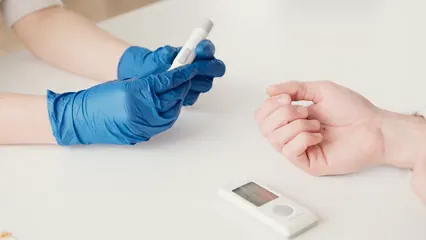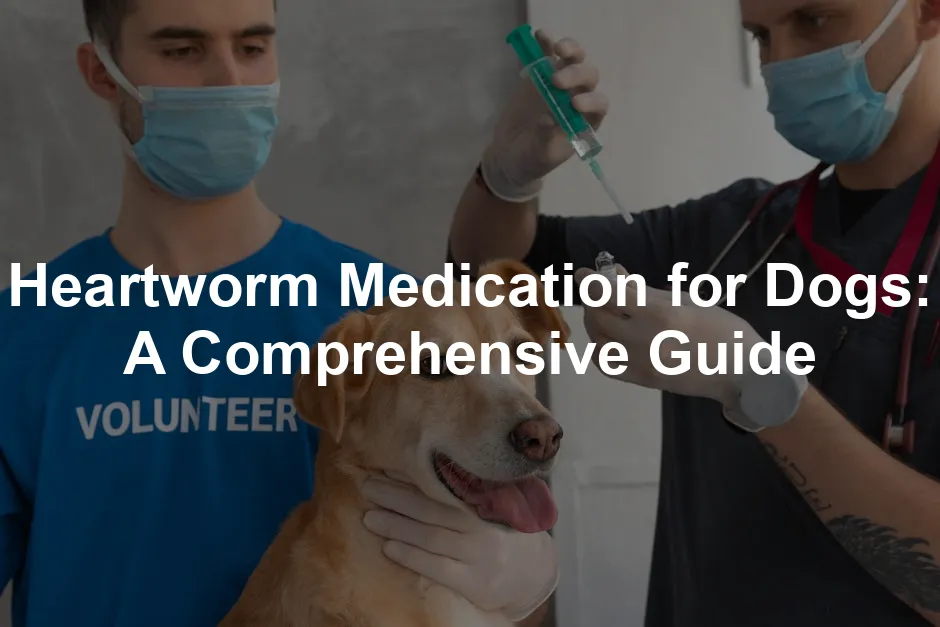Introduction
Heartworm disease poses a serious threat to dogs. This dangerous condition is caused by parasitic worms that can harm your pet’s heart and lungs. Preventive medication is crucial for keeping your furry friend safe. In this article, we aim to provide detailed information about heartworm medications, including their types and proper usage.
Speaking of prevention, don’t forget about Heartgard Plus Chewables for Dogs. These tasty treats not only keep your dog safe from heartworms but also make medication time feel like a reward. Your dog will thank you for it!
Summary and Overview
Heartworm disease spreads through mosquito bites. When an infected mosquito bites a dog, it transmits larvae that grow into adult worms. This disease is prevalent across the United States, with around one million dogs affected. If untreated, heartworms can cause severe health issues, including heart failure.
Heartworm medications fall into two categories: preventive and treatment options. Preventive medications are vital for avoiding infection, while treatment is necessary for infected dogs. Always consult your veterinarian for prescriptions. Regular testing and monitoring are also essential to ensure your dog’s health remains a top priority.

And while you’re at it, consider investing in a Dog Pill Organizer. This handy tool can help you manage your dog’s medications and avoid any missed doses. It’s like a personal assistant for your pup’s health!
Understanding Heartworm Disease
The Life Cycle of Heartworms
Heartworms primarily infect dogs through mosquito bites. When an infected mosquito bites your dog, it deposits heartworm larvae into the bloodstream. These larvae mature into adult worms, which can grow up to a foot long.
In the United States, heartworm cases have been on the rise, with thousands of new cases reported each year. Many regions are at high risk, especially those with warm climates. Keeping your dog safe from mosquitoes is key to prevention. Regular heartworm testing is advisable to catch any infections early.

Symptoms of Heartworm Disease
Heartworm disease can be tricky to spot early. Common symptoms include coughing, fatigue, and weight loss. If your dog seems less energetic than usual, that might be a red flag. You might also notice a decrease in appetite or even fainting spells.
As the disease progresses, symptoms worsen. Mild coughing can turn into persistent coughing. Fatigue may lead to difficulty in exercising or playing. In advanced stages, dogs can develop severe respiratory issues. Monitoring your dog’s behavior is crucial, especially if they live in a high-risk area.
Always keep an eye out for these signs. Early detection can make a huge difference in treatment outcomes. And if you want to be extra prepared, a Dog First Aid Kit can be a lifesaver in emergencies!
Types of Heartworm Medications
Preventive Medications
Preventing heartworm disease is always better than treating it. Heartworm preventive medications are essential for every dog, especially in areas where heartworms are common. These medications protect your furry friend from infection, saving you from the stress and cost of treatment.
There are several forms of preventive medications available. Chewable tablets are popular because dogs often find them tasty. Topical “spot-on” treatments are easy to apply, while injectables provide long-lasting protection. It’s essential to pick a form that suits your dog’s lifestyle.

Several brands offer effective heartworm prevention. Heartgard Plus, Interceptor Plus, and Simparica Trio are all well-regarded. Each works differently, so consult your vet to find the best option for your dog. Regular administration of these medications ensures your pet stays safe from heartworm disease. Always remember, prevention is key!
If you’re looking for alternatives, Interceptor Plus Chewable Tablets are a great option for comprehensive protection against heartworms and intestinal parasites. Your pup deserves the best, right?
Treatment Medications
If your dog tests positive for heartworm, treatment is essential. The process begins with a thorough health evaluation by your veterinarian. They will assess your dog’s overall condition before starting any medication. This step is crucial, as heartworm disease can lead to serious complications.
Treating heartworm infection can be complex and costly. The treatment usually involves medications to kill adult heartworms and microfilariae. Depending on the severity, treatment may take weeks or even months. You might also need to limit your dog’s activity during this time to ensure their recovery.

Several treatment options are available. One common medication is melarsomine, which is administered via injections. Your vet may recommend supportive care as well, including steroids to reduce inflammation. It’s important to follow the vet’s guidelines closely to ensure the best outcome.
While heartworm treatment can be effective, it does come with expenses. Costs vary based on the dog’s size and the treatment plan. Always discuss potential costs with your veterinarian upfront to avoid surprises later. Remember, prevention is always more affordable than treatment. And if you want to keep your dog comfortable while recovering, consider a Dog Bed with Orthopedic Foam for extra support!
How to Choose the Right Heartworm Medication
Consultation with Your Veterinarian
When it comes to selecting heartworm medication, professional guidance is key. Your veterinarian can provide personalized recommendations tailored to your dog’s needs. Factors influencing their advice include your dog’s age, weight, and overall health status.
For example, a puppy might require different medication compared to an older dog. Similarly, a dog with existing health issues may need a specialized approach. Always be open with your vet about any concerns or questions you have regarding medication.

Choosing the right heartworm medication can greatly affect your dog’s health. So, make sure to consult your veterinarian for the best options. They will help you navigate through the choices and find the most suitable prevention or treatment plan for your furry friend. And don’t forget to stock up on Dog Treats for Medication Administration. They make giving meds a breeze!
Reading Labels and Understanding Dosages
Understanding heartworm medication labels is crucial for your dog’s health. Start by checking the active ingredients listed on the label. This helps you know what’s included and how it works.
Look for dosage guidelines based on your dog’s weight. Accurate dosing is essential. Too little may not protect your dog, while too much could harm them. Always follow the veterinarian’s recommendations for dosages closely.
Adhering to the correct schedule is just as important. Missing a dose can leave your dog vulnerable to infection. Set reminders on your phone or use a calendar to help you stay on track. Consistency is key when it comes to heartworm prevention.

Best Practices for Administering Heartworm Medications
Establishing a Routine
Creating a consistent medication schedule benefits both you and your dog. Choose a specific day each month for administering the medication. This makes it easier to remember and keeps your dog protected.
Consider using a pill organizer or treating it like a daily ritual. Incorporate it with something enjoyable, like playtime or treats. This approach makes your dog more receptive to taking their medication. And while you’re at it, why not invest in a Dog Training Clicker? It can help reinforce positive behaviors during medication time!
Monitoring Your Dog’s Health
After giving heartworm medication, keep a close eye on your dog. Watch for any unusual changes in behavior or appetite. It’s normal for some dogs to feel a bit off for a day or two after treatment. However, if you notice severe lethargy, vomiting, or unusual reactions, contact your vet immediately.
Regular veterinary check-ups are crucial for your dog’s well-being. These appointments help ensure your dog remains heartworm-free and healthy. Your vet can monitor your dog’s overall health and adjust medications if needed. Routine blood tests can catch any issues early, allowing for timely interventions.
Post-medication care is vital. Make sure your dog stays active but avoid excessive exercise after treatment. Keeping your dog calm aids in recovery and reduces stress on their heart. Regular check-ups and attentive monitoring will help you maintain your dog’s health effectively. And if you’re traveling, a Dog Carrier Backpack can make outings much easier for both of you!

Frequently Asked Questions (FAQs)
What are the signs that my dog may have heartworm?
Signs of heartworm include coughing, fatigue, and weight loss. If your dog shows sudden changes in behavior or energy levels, it could be a warning sign. Early detection allows for better treatment options.
How often should heartworm preventives be given?
Heartworm preventives should be given monthly, year-round. Consistent administration is essential to maintain protection against infection. Talk to your vet about the best schedule for your dog.
Can heartworm medication be given alongside other medications?
Always consult your vet before combining medications. Some drugs can interact negatively, leading to complications. Your veterinarian will guide you on safe medication combinations for your dog.
What should I do if I miss a dose of heartworm medication?
If you miss a dose, administer it as soon as you remember. However, if it’s close to the time for the next dose, skip the missed one. Never double up on doses, and consult your vet if you’re unsure.
Are there any side effects of heartworm medications?
Side effects can include mild lethargy or digestive upset. If your dog exhibits severe reactions, contact your vet right away. Regular monitoring helps catch any side effects early.
Conclusion
Preventing heartworm disease is essential for your dog’s health. Regular medication, monitoring, and vet check-ups play vital roles in keeping your pet safe. Consult your veterinarian for personalized advice tailored to your dog’s needs.
Achieving peace of mind comes from knowing that you’re taking proactive steps in heartworm prevention. Regular medication and check-ups ensure your dog stays healthy and happy. And don’t overlook the importance of Dog Health Monitoring Devices that can help keep tabs on your pup’s well-being!

Please let us know what you think about our content by leaving a comment down below!
Thank you for reading till here 🙂
All images from Pexels





